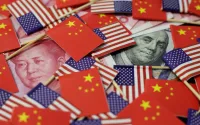Published on Saturday, January 1, 2005 by the Miami Herald Jeffrey D. Sachs
It is time for New Year's resolutions, and this year's are obvious.
When the millennium opened, world leaders pledged to seek peace, the end of poverty and a cleaner environment. Since then, the world has seen countless acts of violence, terrorism, famine and environmental degradation. In 2005, we can begin to change direction.
Knowledge, scientific advance, travel and global communications give us many opportunities to find solutions for the world's great problems. When a new disease called SARS hit China last year, the World Health Organization coordinated the actions of dozens of governments, and the crisis was quickly brought under control, at least for now. When an agricultural research unit called the World Agroforestry Center discovered that a certain tree could help African farmers grow more food, they introduced a new and valuable approach to overcoming Africa's chronic food crisis.
Unfortunately, such examples of international cooperation are as rare as they are impressive. Millions of people could be spared malaria, HIV/AIDS, hunger and horrendous living conditions in slums. The problem is not that we lack good solutions, but that we fail to cooperate globally to put those solutions into practice.
U.N. Secretary-General Kofi Annan has appointed me his special advisor on the Millennium Development Goals, asking me to lead a group of scholars and development experts in identifying practical steps to reach the goals by the target date in 2015. Our study, Investing in Development: A Practical Plan to Achieve the Millennium Development Goals, will be issued to Annan on Jan. 17, 2005, and will be available at www.unmillennium project.org.
What we learned is easily summarized. For every major problem -- hunger, illiteracy, malnutrition, malaria, AIDS, drought and so forth -- there are proven and affordable solutions. These investments would strengthen the private sector and economic growth, but they require global partnership between the world's rich and poor countries. Most important, the world's richest countries need to do much more to help the poorest countries fight disease, educate their children and protect the environment.
The United States, for example, currently spends around $450 billion each year on its military, but less than $15 billion in development aid. This is a mistake, because only shared prosperity -- not military approaches alone -- can make America truly safe and the planet secure.
Germany, Japan and several other rich countries are also doing much less than they should. In 2002, all donor countries committed to ''make concrete efforts'' to reach 0.7 percent of national income in development aid. Germany, Japan and the United States, among others, remain far below this commitment.
The year 2005 will offer many opportunities to reverse course. After our report is released in January, Annan will issue another in the spring, identifying the practical steps that should be taken this year.
Sustained peace
Around the same time, an important commission on Africa will issue a report to United Kingdom Prime Minister Tony Blair, and in July the United Kingdom will host the annual G-8 Summit of the rich countries, which Blair has promised will focus on the fight against poverty and long-term climate change. In September, the world's leaders will reconvene at the United Nations to decide on their actions during the coming decade.
Nothing would be wiser for the world's rich countries than to fulfill their pledges to the world's poor, hungry and disease-ridden peoples.
Therein lies the path to sustained peace.
2005 is the year that words can become reality and the world can begin to fulfill its hopes for our new millennium.
Jeffrey D. Sachs is professor of economics and director of the Earth Institute at Columbia University.






